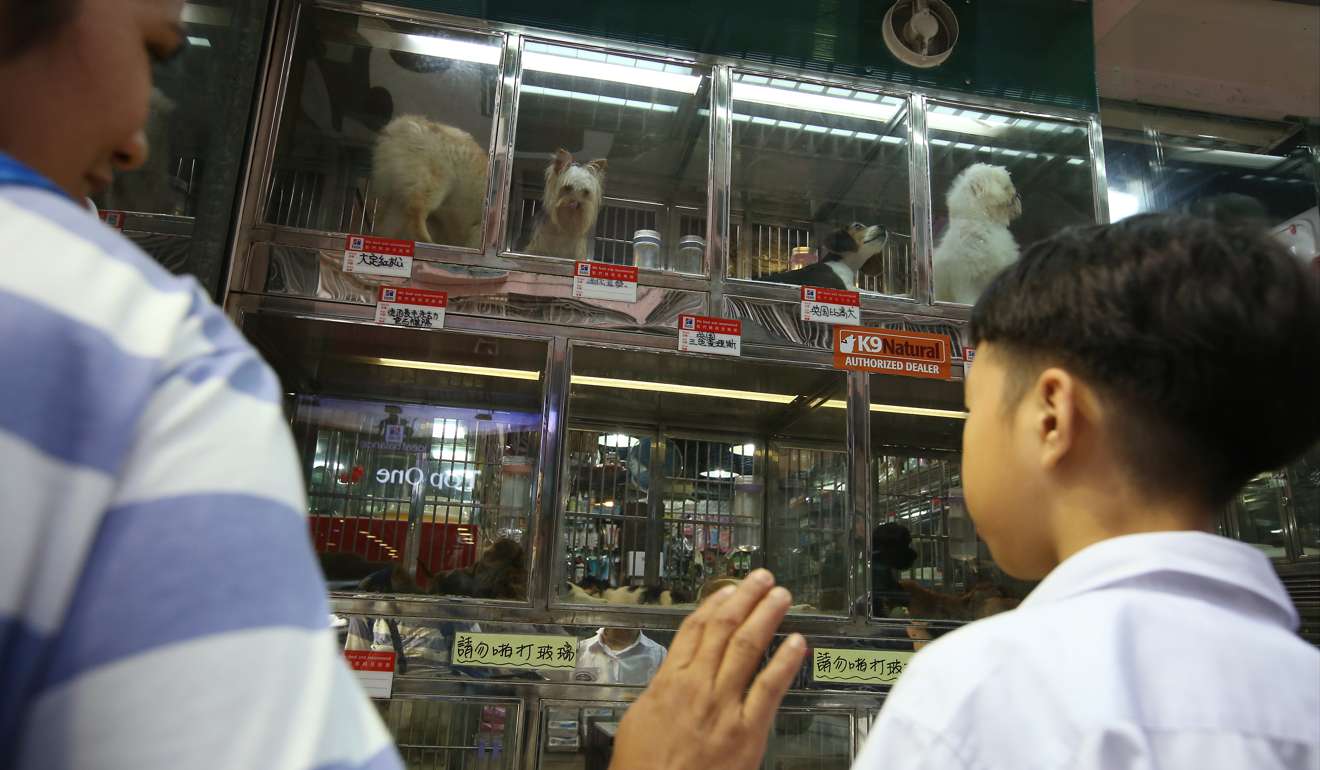
Advocates call for higher age restrictions as Hong Kong passes tough new law to kick outdated animal welfare practices
From March 20, all breeders and traders will require a licence, with penalties raised to enforce standards
Dog owner Marco Leung Chun-hin did not go to a pet shop to buy his female Japanese Spitz. Instead, he went to a home breeder that he found online.
“I don’t really trust pet shops because they don’t always tell you the source of the breeding,” the 26-year-old insurance agent said. “However, I can know that by going to the breeder directly and check the living conditions of the dog’s mother. Not to mention it’s much cheaper”
Leung got his dog, named Hung Jai, for HK$4,000 from the breeder’s apartment in Sham Shui Po three years ago. To date, home breeders in Hong Kong have not required a licence to operate, but that is set to change from next month, with the government introducing tighter laws aimed at improving animal welfare practices across the board.
From March 20, all animal breeders, traders and one-off sellers will be required to obtain a licence or permit.
For dog breeders, keeping four or fewer bitches will require a category A licence, while having five or more will require category B. One-off permits valid for a six-month period will be available for dog owners who simply wish to sell their pet.
Watch: High rent forces dog saver out of pet-friendly Ap Lei Chau
Selling a dog to a person under the age of 16 will also be prohibited under the new regulations.
The amendment came years after animal lovers called for a review of the city’s outdated animal trading and breeding regulations. Although it was seen as a victory for animal welfare groups, some say the restrictions fell short of discouraging impulse purchases or pet abandonment.
Hong Kong Dog Rescue founder Sally Andersen, a supporter of the new breeding laws, said the age restriction of 16 was “far too young”.
“Personally, we don’t home dogs to anybody under 21,” she said.
“There’s still a whole life ahead of you, and no body in that age can anticipate what’s going to happen,” she said.

Protection of Animals Lantau South founder Jacqui Green said she was confident the new laws would improve the welfare of Hong Kong’s dogs. Echoing Andersen’s concerns however, Green said the age restrictions were still too low and urged the government to raise them to 21, or at least 18.
Green reiterated her opposition to pet shops and said she would support a blanket ban on such operations – similar to laws introduced in parts of Europe and the United States.
“Pets here are a commodity”, she said. “I think that is very wrong. It fosters a culture where they can be discarded and makes it harder to know whether an animal will have a home for life. Pet shops are irresponsible, unethical and immoral.”
The Agriculture, Fisheries and Conservation Department, which will enforce the new laws, said the age requirement aligned with its definition of a “keeper” outlined under the city’s Rabies Ordinance.
No matter how big your premises are, I believe there comes a point where animals can’t be adequately socialised
“Setting a minimum age for buying a dog was one of the requests made by some parties during the public consultation and supported by animal traders,” the department said.
A team of more than 30 department officials will be deployed to enforce the new laws, and ensure dog breeders’ premises meet space requirements.
“Applicants that do not allow officers to inspect the premises will not be granted a licence, while licensees who fail to comply with the inspection requirement may be considered in breach of their licence conditions and subject to prosecution or have their licence revoked.”
Penalties for breeching the new laws have also been ramped up. Those found operating without a licence or permit will be hit with a HK$100,000 fine, up from just HK$2,000. And those who violate the conditions of their license or permit will face a HK$50,000 fine.

Despite the harsher penalties, Mark Mak Chi-ho, executive chairman of the Non-Profit Making Veterinary Services Society, said instead of curbing unethical breeding practices, the new law would only make matters worse.
He described the law as a “deterioration” of animal protections, because it legalised and encouraged unethical home breeders.
“The most effective way is to limit the supply by making home breeding unlawful. When the supply of dogs decreases, the price will go up, meaning buyers will think twice before splashing a large amount of money,” he said.
The AFCD issued 63,400 new or renewed dog licences in 2014-2015, up from 62,000 in 2013-14. Census data from 2011 showed 166,500, or 7.1 per cent of the city’s households kept pet dogs. Of those, 40.5 per cent purchased their animals from a pet shop, while 36 per cent were given them by relatives or friends.
Amanda Whitfort, associate professor at the University of Hong Kong’s law faculty, welcomed the enhanced regulation around animal breeding, sales and ownership.
But like fellow animal welfare advocates, Whitfort said there was still room for improvement. She suggested the government cap the number of dogs that breeders are allowed to keep on their premises, and setminimum welfare requirements.
“No matter how big your premises are, I believe there comes a point where animals can’t be adequately socialised because there are too many of them, and the people managing them don’t have the time to provide the socialisation that puppies need.”


